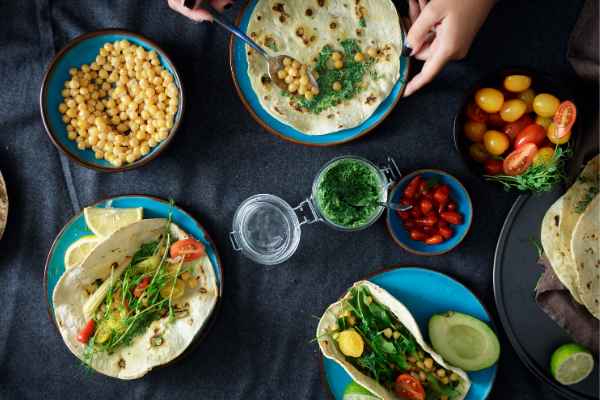
People often follow vegetarian diets for religious or personal reasons, as well as ethical issues such as animal rights or concern for the environment. Many people believe that vegetarian diets are healthier. However, whether you consume animal products or not, to achieve a healthy, well-balanced diet, you will need to put some thought into your dietary decisions.
A well-planned vegetarian diet may reduce the risk of chronic disease, support weight loss, and improve the nutritional quality of your diet. In fact, studies show that vegetarians tend to have better diet quality than meat-eaters in regards to essential nutrients like fiber, vitamin C, vitamin E, and magnesium.
However, if your diet is not well-rounded, you may increase your risk of certain nutritional deficiencies. Meat, poultry, and fish supply the right amount of protein and omega-3 fatty acids, as well as micronutrients like zinc, selenium, iron, and vitamin B12. Other animal products like dairy and eggs also contain proper amounts of calcium, vitamin D, and B vitamins. When cutting meat or other animal products from your diet, it’s important to ensure you are getting these essential nutrients from other sources.
There are several forms of vegetarianism, the most common types include:
- Lacto-ovo-vegetarian: Eliminates meat, fish, and poultry but allows eggs and dairy products.
- Lacto-vegetarian: Eliminates meat, fish, poultry, and eggs but allows dairy products.
- Ovo-vegetarian: Eliminates meat, fish, poultry, and dairy products but allows eggs.
- Pescatarian: Eliminates meat and poultry but allows fish and sometimes eggs and dairy products.
- Vegan: Eliminates meat, fish, poultry, eggs, and dairy products, as well as other animal-derived products, such as honey, beeswax, and pollen.
- Flexitarian: A mostly vegetarian diet that incorporates occasional meat, fish, or poultry.
Whether you are a vegetarian or not, aim to include a variety of fruits, vegetables, whole grains, protein sources, and fortified foods to ensure balanced nutrition. You may also consider taking multivitamins and/or supplements to fill in any gaps for potential deficiencies.
Some examples of foods to consume when following a vegetarian diet include:
- All fruits and vegetables!
- Whole grains such as quinoa, barley, buckwheat, rice, oats, etc.
- Beans and legumes such as lentils, beans, peas, chickpeas, etc.
- Nuts such as almonds, walnuts, brazil nuts, hazelnuts, cashews, etc.
- Seeds such as flaxseeds, chia seeds, pumpkin seeds, sunflower seeds, hemp seeds.
- Healthy fats such as coconut oil, olives, olive oil, avocado.
- Proteins sources such as tempeh, tofu, seitan, nutritional yeast, spirulina, and if your diet allows, eggs and dairy products.




















